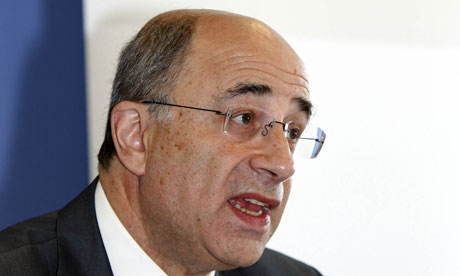Interesting that he specifically cites the long history of such failure (remember: 3 RCPs, Calcutt; 3 press regulators from GCP to PC to PCC to...?).
Tory National Heritage Minister (the ministry now known as DCMS, or Culture ministry) in 1995, Stephen Dorrell, related yesterday how PM John Major asked him for 3 options which would boil down to taking no action over Calcutt's 1995 report, when he said the PCC had failed to grasp the chance given and must now be replaced with a statutory regulator. Doubly useful, as you now have an ever better source to cite in your exam than DB!
Leveson inquiry no closer to solving press puzzle
As the weeks pass, his lordship's occasional giggles at the scale of his task are beginning to seem faintly hysterical
Why do I see this all coming back to hit me?" asked a plaintive Lord Justice Leveson of no one in particular. His inquiry into how to fix the media is now well into its seventh month, and with each brace of witnesses breezing into his court, each towering stack of evidence accumulating on the desks of his counsel, he seems ever more oppressed by the scale of the task facing him.
When it comes to ambitious attempts to design a model for the unruly press, as he noted, "we have been here several times since the last war". Unhappily, as a lengthening queue of witnesses cheerfully point out to him, all previous attempts have ended in worthy, laudable irrelevance. His lordship is desperate to avoid joining them, but as the weeks pass his occasional giggles at the absurd scale of his task begin to seem faintly hysterical. Does anyone have any good ideas?
First to offer an encouraging historical precedent was Stephen Dorrell (remember him?), onetime national heritage minister (remember that?) under John Major. In 1995, Dorrell found himself charged with recommending the government response to the second report by Sir David Calcutt, who had judged that the press couldn't control itself and should be regulated. Dorrell shared with the court the Yes Minister script which the government had evidently been enacting at the time, disguised as a memo he sent to Major advising the government response.
"You asked how we might present a do-nothing option," Dorrell had written. He had had three suggestions, he told the court: One, simply ignore it – "this has worked surprisingly well so far". Two: "Announce that we will do nothing." He "wasn't attracted" to that.His third, recommended, option was to promise to look at legislation, "when parliamentary time permits". Meaning never? A smile. "We had to present our conclusion that we were going to do nothing in the least-bad way." His lordship looked pained.
Maybe Andrew Marr could help. He had, after all, aquired serious newspaper chops as editor of the Independent, been political editor of the BBC and even had a spell in front of the firing squad himself, after taking out a superinjunction in 2008 to conceal details of his private life. Surely he would have some thoughts.
Could he suggest a model for legislation, for instance, that would cover blogs, asked Leveson? Gosh yes, that was "a nightmarishly difficult problem", said Marr.
It must surely be possible to devise a mechanism that balances restraint and freedom of expression? "I am, like the inquiry, struggling to understand what such a system might actually look like."
Leveson tried again. Did Marr agree that victims of defamation should have access to a "fast, reliable and cheap" mechanism allowing them to resolve their complaints? "Yes absolutely."
A pause. "Any ideas?"
Alas, said Marr with an apologetic grin, his role at the BBC meant it would fall to him, in due course, "to criticise the inquiry for whatever it comes up with" rather than offer suggestions as to its content.
"Yes," said Leveson, weakly.
That left Jeremy Paxman, a man certain to offer warm support and encouragement. First, though, the Newsnight presenter had a little firecracker up his sleeves that he had evidently planned to detonate, in recounting a lunch at Trinity Mirror in 2002.
The guests had included (the company's then chair) Sir Victor Blank, (then Mirror editor) Piers Morgan, some woman who edited the Sunday Mirror whose he name couldn't remember, and Ulrika Jonsson. He could recall it "very vividly" – "It was so unusual to be invited to such a bestiary." And then Morgan had told him how to hack a phone. There was a long, hanging pause in court.
(Implicating Morgan may require more substantial ammunition, however. "Right, that's the last time I invite Jeremy Paxman to dinner," Morgan tweeted shortly afterwards. "Ungrateful wretch.")
The presenter had one small stink bomb yet to lob at his lordship on his way out the door. Had he any general points to make about the inquiry, asked Leveson? A scoff. "I wish you joy of it. Because I think it's a very, very difficult job you have … your challenge is to stop yourself becoming a total irrelevance."
"Sorry," said Paxman, "is this lese-majesty?" Don't worry, said Leveson.

No comments:
Post a Comment
Comments and suggestions are very welcome ... but please ensure all comments are appropriate! All comments are moderated before publication. Spam will be reported